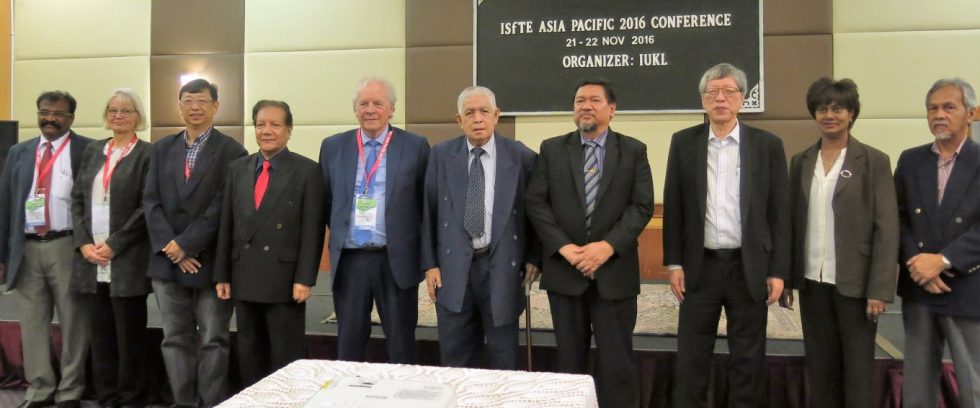
Putrajaya 21 Nov – The International Society for Teacher Education (ISfTE) 2016 Asia Pacific Regional Conference held from 21 until 22 November in Putrajaya under the theme “Global Citizenship Education” has drawn more than 120 participants from local and international.
Seventy-nine papers were presented by 30 experts from Malaysia and 49 foreigners from Indonesia, Philippines, Japan, Hong Kong, India, Australia, Taiwan, China, Norway, Denmark, USA, Mauritius, Vietnam, United Arab Emirates (UAE), and South Africa.
The Chairman, (IUKL) Board of Governors, Tan Sri Dr. Hadenan Abdul Jalil said that the education level globally is inevitably not homogeneous as each country continues to face issues related to educating their citizens.
The world has moved to be a borderless collection of countries and states and as such education given to citizens will be global in nature so that students going through the education process will be able to interact and survive in the international environment.
Those in the underdeveloped countries he said, have to struggle in educating their citizens as they continue to face problems such as lack of funds to finance the education sector, especially in countries with big percentage of younger generation.
“We observe that different level of education exists within a country mainly linked to the people’s living standard, their social position, and geographical location. Education policymakers continue to grapple with issues related, to provide or prepare their young citizens for the global survival and also to balance it with national needs related to culture and spirit of nationalism,” said Hadenan, at the official opening ceremony of the International Society for Teacher Education (ISfTE) 2016 Asia Pacific Regional Conference.
He said the theme of this conference is very relevant as it is necessary for educators to continue facing the ever-changing challenges in all aspects of life, i.e the environment, political, and social issues.
The official opening ceremony of the International Society for Teacher Education (ISfTE) 2016 Asia Pacific Regional Conference.
Also present were ISfTE Founding Member, Professor Dr. Colin Mably (USA), Secretary General, Prof. Dr. Jacky Pow (Hong Kong), Prof. Emeritus Datuk Dr. Ibrahim Ahmad Bajunid (Malaysia) and Prof. Dr. Karen Bjerg Petersen (Denmark).
The IUKL Vice Chancellor, Prof. Dr. Roslan Zainal Abidin appreciated the effort of ISfTE to come to Malaysia and made IUKL host the first regional event in Asia Pacific.
ISfTE has been established 36 years ago with its head office in New York (USA) while its Secretary General, Associate Professor Dr. Jacky Pow is based in Hong Kong.
Roslan said that discussions and new ideas from the conference will be translated into actions and adopted by the education department of IUKL which has been functioning for the past 14 years.
Scholar teachers are needed in the society –Dr. Ibrahim
People like to fictionalize their character as it evolves all the time and will never reach a perfect character at any time, said Professor Emeritus Datuk Dr. Ibrahim Ahmad Bajunid.
Ibrahim who is from INTI-Laureate International Universities, Malaysia, said that, unfortunately, the intellectual character part is neglected.
“We have to develop a particular intellectual character in ourselves for personal development. We have to find intellectual, spiritual and aesthetic soul mates to reveal the education curriculum in the case of teachers.
“We must accept changes (except religious texts) and should not worry about the changes but worry if there is no change. If there are changes in culture, technology, politics, and economy, there must also be changes in education. But the problem is, we have lost the intellectual leadership in the society,” said Ibrahim.
Ibrahim said that in his keynote address, “Conjuring the education phoenix: The Call of Scholar-Teachers” at the ISfTE Asia Pacific 2016 Conference here today.
He added scholar-teachers are needed in the society to make the profession highly honored.
Many youngsters in Denmark are dropouts and do not care to pursue higher education as early as 14 years of age, said Prof. Dr. Karen Bjerg Petersen.
Karen said that the same problem happens all over Europe. In Denmark, about 50 percent youngsters are dropouts and the rest enter high school while 42 percent enter the university.
“Among the problems contributing to the youngsters’ dropouts is their parents are alcoholics or drug addicts. The dropouts are rampant among immigrants even though education is free in Denmark,” she said.
Source: Malaysia World News

